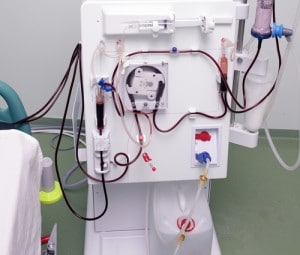
Federal Lawsuits Filed Against GranuFlo Manufacturer Could Be Consolidated into One MDL
Plaintiffs with defective drug lawsuits against Granuflo may be able to consolidate their cases into one multidistrict litigation (MDL) soon. They filed a motion with the US Judicial Panel on Multidistrict Litigation (JPML) to consolidate all federally-filed GranuFlo injury lawsuits into one jurisdiction in order to coordinate the pretrial proceedings. Plaintiffs asked the panel to establish the MDL in the US District Court in Massachusetts, either with Judge Patti B. Saris, or Judge Joseph L. Tauro.
Multidistrict litigation is appropriate when cases, usually civil actions, involving one or more common questions are pending in different districts. In the case of the GranuFlo defective drug lawsuits, questions include whether Fresenius Medical Care knew or should have known that GranuFlo and Naturalyte dialysis powders can cause injuries such as heart attacks.
A statement issued by Fresenius said: “The company believes that these lawsuits are without merit, and intends to defend them vigorously.”
“One has to understand the nature of the medical status that influences the acid/base balance in dialysis patients,” said Ben Lipps, chief executive officer of Fresenius Medical Care. “The company’s actions related to these products were appropriate and responsible. Both products are safe and effective and were reviewed and cleared by the Food and Drug Administration several years ago. I am confident of our position on this medical issue.”
Fresenius Failed To Warn FDA of Defective Drugs GranuFlo and Naturalyte
Fresenius manufactured GranuFlo and Naturalyte powders to work with dialysis treatments, to help keep acid from building up in the blood. In November of 2011, an internal memo, seen only by Fresenius doctors and clinicians, warned that the products increased the risk of cardiopulmonary arrest, or even cardiac death, in certain patients. The memo stated that the issue should be addressed immediately, but the company did not send a copy of the memo to the FDA.
In March of 2012, the FDA officially recalled GranuFlo and Naturalyte powders under a Class I recall, the strongest recall possible. “The manufacturer is cautioning clinicians to be aware of the concentration of acetate or sodium diacetate (acetic acid plus acetate) contained in Fresenius’ Naturalyte Liquid and Granuflo Dry Acid Concentrate. Inappropriate prescription of these products can lead to a high serum bicarbonate level in patients undergoing hemodialysis. This may contribute to metabolic alkalosis, which is a significant risk factor associated with low blood pressure, hypokalemia, hypoxemia, hypercapnia and cardiac arrhythmia, which, if not appropriately treated, may culminate in cardiopulmonary arrest. This product may cause serious adverse health consequences, including death,” the FDA stated in its recall notice.
“FDA has issued a general safety communication related to inappropriate prescription and resultant alkali dosing errors in the dialysate concentrates used in hemodialysis.”
The FDA is currently investigating Fresenius to determine if the manufacturer violated federal law by failing to warn patients and doctors at non-Fresenius clinics of the serious, sometimes deadly, risks of using GranuFlo and Naturalyte concentrates.
Jon Stone, a spokesman for Fresenius Medical Care, told Nephrology News & Issues: “”Fresenius Medical Care is dedicated to improving the effectiveness and safety of dialysis treatment for all persons with kidney failure, regardless of whether they are patients in our fresenius medical services (FMS) clinics or users of our products. the chief medical office of FMS, in particular, regularly reviews and studies available data in an on-going effort to improve treatment methods, and it remains at the cutting-edge of improvements and refinements in the dialysis field.
“As a result of the office”s efforts, its review of data may sometimes identify a working hypothesis or preliminary concern that it wants its medical directors and admitting clinicians to consider, but which it does not view as sufficiently developed to support peer reviewed or general external publication.”
The Strom Law Firm Can Help With GranuFlo and Naturalyte Defective Drug Injuries


